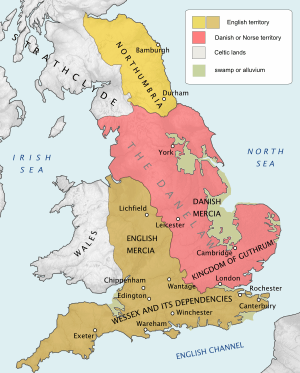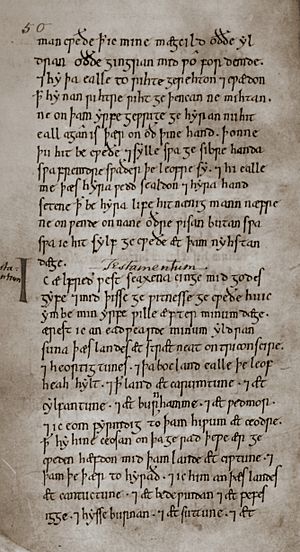Æthelwold ætheling facts for kids
Æthelwold (died December 13, 902) was a prince in the kingdom of Wessex. He was the younger of two known sons of King Æthelred I, who ruled Wessex from 865 to 871. Æthelwold and his brother, Æthelhelm, were very young when their father died. King Æthelred died while fighting against a large Viking invasion.
Instead of Æthelwold, the throne went to his uncle, Alfred the Great. Alfred continued the war against the Vikings. He won a very important battle called the Battle of Edington in 878.
After Alfred died in 899, Æthelwold believed he should be the next king. He argued with Alfred's son, Edward the Elder. As a senior ætheling (a prince who could become king), Æthelwold had a strong claim. He tried to gather an army to support himself. But he could not get enough help to fight Edward. So, he fled to Northumbria, an area controlled by Vikings. There, he was accepted as their king.
In 901 or 902, Æthelwold sailed with a fleet to Essex. He was also accepted as king there. The next year, Æthelwold convinced the Danes from East Anglia to attack Edward's lands. These lands were in Wessex and Mercia. Edward fought back by raiding East Anglia. When Edward's main army left, the men from Kent stayed behind. They met the East Anglian Danes in a battle called the Battle of the Holme. This happened on December 13, 902, at an unknown location. The Danes won the battle but lost many men. Æthelwold was killed, which ended his challenge to Edward's rule.
Contents
A Look Back in Time
In the 700s, Mercia was the most powerful kingdom in southern England. But in the early 800s, Wessex became stronger. In the 820s, King Egbert of Wessex took control of south-east England. This included Kent, Surrey, Sussex, and Essex.
During Egbert's rule, Viking attacks began. But Egbert and his son, Æthelwulf, were able to fight them off. Æthelwulf died in 858. After him, four of his sons became king one after another. King Æthelbald died in 860. King Æthelberht died in 865. Then, Æthelwold's father, Æthelred, became king.
In the same year, a huge Viking army, called the Great Heathen Army, invaded England. Within five years, they had conquered Northumbria and East Anglia. They also forced Mercia to pay them to leave. In late 870, the Vikings invaded Wessex. In early 871, they fought four quick battles against armies led by Æthelred and Alfred. Wessex lost the last two battles.
Æthelred died soon after Easter that year. He left behind young sons. In those days, the oldest son did not always become king. It was thought that kings should be adults. So, Æthelred's younger brother, Alfred, became king.
By 878, the Vikings had taken eastern Mercia. They had almost conquered Wessex. Alfred was forced to hide in the Somerset marshes. But he fought back and won the important Battle of Edington. After this, there was a time of peace. In the late 880s, Alfred made a treaty with Guthrum. Guthrum was the Viking king of East Anglia. This treaty set the border between Wessex and English Mercia on one side, and the Viking-controlled Danelaw on the other. More Viking attacks happened in the mid-890s, but they were not successful.
Æthelwold's Early Life
We don't know much about Æthelwold's immediate family. His father, Æthelred, was born around 848 and died in 871. This means his sons were very young children when he passed away. Æthelred's wife was likely Wulfthryth. She was called regina (queen) in a document from 868.
Æthelwold and his older brother, Æthelhelm, are first mentioned in King Alfred's will. This will was written in the 880s. We don't hear about Æthelhelm again, so he probably died soon after. The only other mention of Æthelwold before Alfred's death is in a document from the 890s.
After King Æthelred died in 871, his sons' supporters complained. They said Alfred was keeping property that should have gone to his nephews. Alfred explained his actions in his will. He said the dispute was about property left in his father Æthelwulf's will.
Æthelwulf had left property to three of his sons: Æthelbald, Æthelred, and Alfred. He said that the brother who lived the longest would inherit all of it. When Æthelred became king in 865, Alfred asked for the property to be divided. Æthelred refused. Instead, he offered to leave it all to Alfred when he died. Alfred agreed.
However, the Viking invasion changed things. They needed to provide for their children. So, they made a new agreement in late 870 or early 871. The brother who lived longest would still keep the property left to the three brothers. But he would give his brother's children any lands he had received separately from their father. He would also give them any lands he had gained later.
In his will, Alfred said that people were arguing about the inheritance. He brought King Æthelwulf's will to a meeting of his council, called the witan. He asked everyone to speak honestly about what was right. They all said that Alfred had the right to the property.
In his own will, Alfred left most of his property to his son, Edward. Æthelhelm received eight estates (pieces of land). Æthelwold only received three estates. These were at Godalming and Guildford in Surrey, and Steyning in Sussex. All of these were in the less important eastern part of the kingdom. The largest was Steyning, where Æthelwulf was first buried. Alfred may have moved his father's body to Winchester. This might have been because he had to give Steyning to Æthelwold. He didn't want his nephew to have the honor of owning his grandfather's grave.
Historians believe that Æthelwold was likely upset by this. He received much less property than Edward. This anger probably led to his rebellion after Alfred died. Alfred also helped his son Edward by promoting men who would support him. He also gave Edward chances to lead in battle.
Some historians think that Æthelwold's position was still strong. His mother was called a queen, while Alfred's wife was not. This might have given Æthelwold an advantage over Edward. Æthelwold was still the senior ætheling. In one document, both he and Edward are called filius regis (son of a king). But Æthelwold is listed before Edward, which suggests he was ranked higher.
Æthelwold's Rebellion
After Alfred died in 899, Æthelwold tried to become king. Many people, both English and Viking, thought Æthelwold had a stronger claim than Edward.
According to one old record, the Anglo-Saxon Chronicle, Æthelwold took a nun from her convent. He did this without King Edward's permission. Her identity is not known. But this act was probably meant to strengthen his claim to the throne. Æthelwold took her to royal estates at Twynham (now Christchurch) and then Wimborne Minster. Wimborne was important because it was his father's burial place. He declared that he would "live or die there."
However, when Edward's army came close, Æthelwold could not get enough support to fight them. He left his companion behind and fled. He went to the Danes in Northumbria, who accepted him as their king. Coins were even made in Northumbria with the name 'Alwaldus', which is thought to be Æthelwold.
Æthelwold's time as king in Northumbria was short. He probably saw it as a base to gain power in Wessex. In 901 or 902, he sailed with a fleet to Essex. There, the local Vikings accepted him as king.
The East Anglian Danes joined Æthelwold in a raid on Mercia. They reached as far as the fortified town, or burh, at Cricklade. This was on the border with Wessex. He then crossed the Thames river into Wessex itself to raid Braydon. Edward fought back by attacking Danish East Anglia. But he left without fighting Æthelwold directly.
The men of Kent stayed behind, even though Edward sent messengers to call them back. The Danes caught up with the Kentish men to fight the Battle of the Holme. The exact location is not known. The Danes won the battle but lost many important leaders. Æthelwold was among those killed. Also killed were Eohric, the Viking king of East Anglia, and several Danish noblemen. The Kentish side also lost their two main leaders, called ealdormen.
The bravery of the Kentish soldiers made Edward's decision to leave the battle look bad. Edward later married Sigehelm's daughter, Eadgifu. Sigehelm was one of the Kentish leaders killed in the battle. This marriage might have been to make his Kentish subjects happy.
Different versions of the Anglo-Saxon Chronicle tell the story of the revolt differently. Some versions show Æthelwold's claim as more legitimate. Others, written later, try to make King Edward look better.
Æthelwold's Impact
Historians note that Æthelwold was able to get support from many areas. He had allies from Wessex, Northumbria, East Anglia, and possibly Mercia and Essex. For a time, Æthelwold might have been the most powerful ruler in England. Edward's hesitation to fight him might have been for good reason.
Some historians believe that Æthelwold had a fair claim to the kingship. They think he was very close to succeeding. If he had not been killed at the Battle of the Holme, he might have united England with less fighting. One historian said that if not for the battle, Æthelwold "might very well have been regarded as one of the greatest figures in our island's story." Another called him one of the "Nearly Men" of early Medieval Europe. An old record from the 1100s called him "king of the pagans."
We don't know if Æthelwold had any children. But the historian Æthelweard was a great-great-grandson of King Æthelred. This connection might have been through Æthelwold.
Some historians suggest that a rivalry between King Eadwig and his younger brother Edgar in the 950s goes back to the Battle of the Holme. Eadwig's wife, Ælfgifu, was probably Æthelweard's sister. One of Eadwig's supporters might have been related to a Mercian prince whose son died fighting with Æthelwold.
The marriage between Eadwig and Ælfgifu was ended because they were too closely related. Edgar became king when Eadwig died without children. Æthelweard, Æthelwold's possible descendant, became a powerful leader in the late 900s. His grandson, Æthelnoth, became an archbishop in the 1000s. This shows that Æthelred's family kept their land and power for a long time after his death.
See Also
Images for kids
 | Sharif Bey |
 | Hale Woodruff |
 | Richmond Barthé |
 | Purvis Young |




